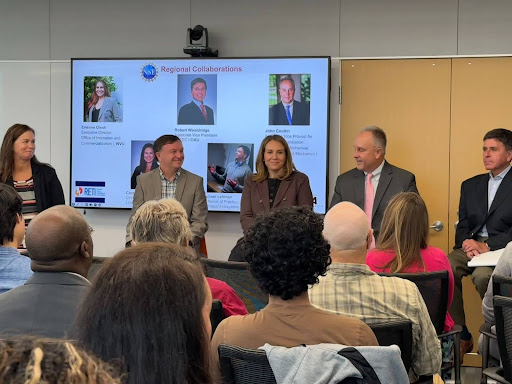
Lehigh University’s Research Translation AcceLUrator was highlighted at Carnegie Mellon University’s 2025 Startup Week, a multi-day celebration of entrepreneurship, innovation, and frontier technology hosted by CMU’s Swartz Center for Entrepreneurship. From September 23 to 26, the event brought together roughly 2,000 academics, researchers, investors, founders, and university leaders for over 25 events to explore strategies for accelerating innovation and advancing regional tech ecosystems.
To kick off Startup Week, Lehigh University’s Research Translation AcceLUrator took part in the Unlocking Government Funding for Research Translation panel. The discussion featured faculty and innovation leaders from Lehigh University, West Virginia University, and CMU in a discussion on how federal programs can accelerate research commercialization.
Moderated by Robert Wooldridge, Associate Vice President of CMU’s Center for Technology Transfer and Enterprise Creation, the panel included John Coulter, Associate Vice Provost for Research Translation and Professor of Mechanical Engineering and Mechanics at Lehigh University; Michael Lehman, Professor of Practice and Director of Technical Entrepreneurship at Lehigh University; Erienne Olesh, Executive Director of the Office of Innovation & Commercialization at West Virginia University; and Cindy Chepanoske, Director of Technology Licensing at CMU.
Panelists discussed how collaboration across universities can open new pathways to federal funding and help researchers strengthen their proposals to agencies such as the NSF, NIH, and DoD. The conversation highlighted strategies for creating competitive submissions that align research goals with agency priorities to increase the likelihood of being successfully awarded a grant.
Drawing from programs like the NSF Accelerating Research Translation (ART) initiative, the panelists highlighted how university partnerships can increase opportunities for federal research funding that can provide anywhere between $250,000 to several million dollars in funding. Lehigh’s participation carried special significance, as CMU serves as the Lehigh Research Translation AcceLUrator’s formal mentor institution through the NSF ART grant.
“Our partnership with Carnegie Mellon has been instrumental since the very beginning of our ART project,” said Coulter. “They’ve served as a mentor institution, helping us strengthen our infrastructure for technology transfer and translational research.”
As part of Lehigh’s ongoing collaboration with CMU, teams from both universities met ahead of Startup Week to advance joint efforts to improve tools for assessing university innovations. Along with Professors Coulter and Lehman, Lehigh’s Rick Smith, Mike Rincunas, and Kevin Major met with CMU’s technology transfer leaders to refine and expand the Startup Assessment Tool (STAT) – a resource developed at CMU to help determine whether a new invention is best suited for licensing or launching as a startup.
“It was really valuable to see, from an institution that’s been doing this work at scale for decades, what can be done,” said Kevin Major, External Engagement Officer for Lehigh’s Interdisciplinary Research Institutes.
Lehman also brought a cohort of master’s students from Lehigh’s Technical Entrepreneurship program to participate in Startup Week activities, including the AI & Robotics Venture Day, where over 30 companies pitched real-world applications in automation, healthcare, and frontier technologies.
“As an educator, I’m all about connecting graduate students with real people who’ve done real translational work,” said Lehman. He explained that it’s not just about observation, but about fostering interactive dialogue. Lehigh’s relationship with Carnegie Mellon, he added, allows students access to innovators and researchers they wouldn’t otherwise meet, strengthening their hands-on learning and exposure to real-world research translation.
The collaboration between Lehigh and Carnegie Mellon continues to grow through shared initiatives, educational exchanges, and the joint development of resources to advance research translation across institutions.
“We’re learning from one another,” said Coulter. “These partnerships strengthen not just our universities, but the entire ecosystem of innovation that connects academic research to societal benefit.”
We’re learning from one another. These partnerships strengthen not just our universities, but the entire ecosystem of innovation that connects academic research to societal benefit. --John Coulter
